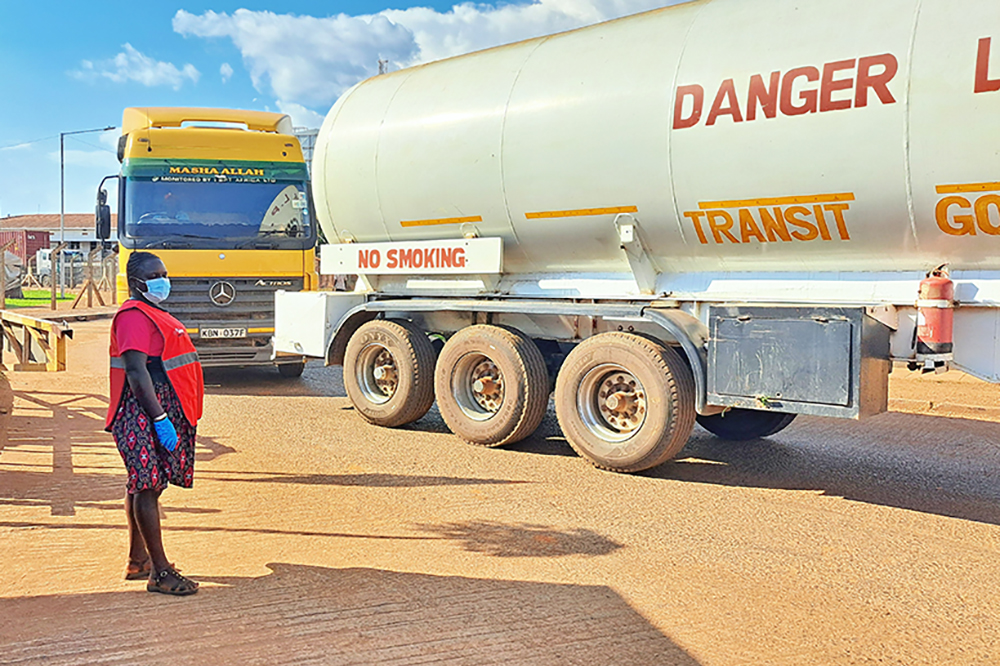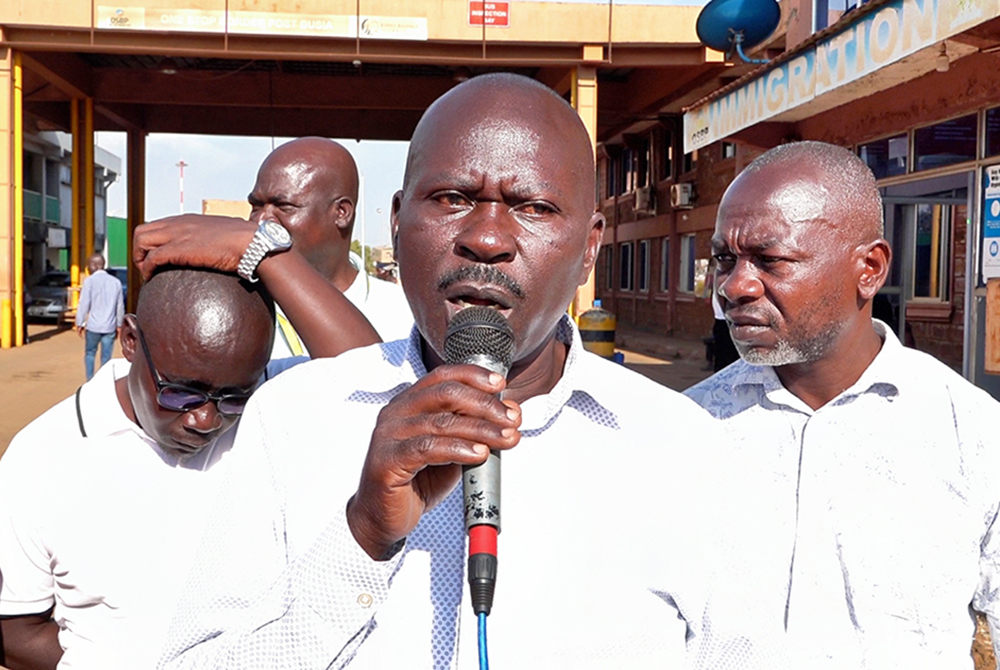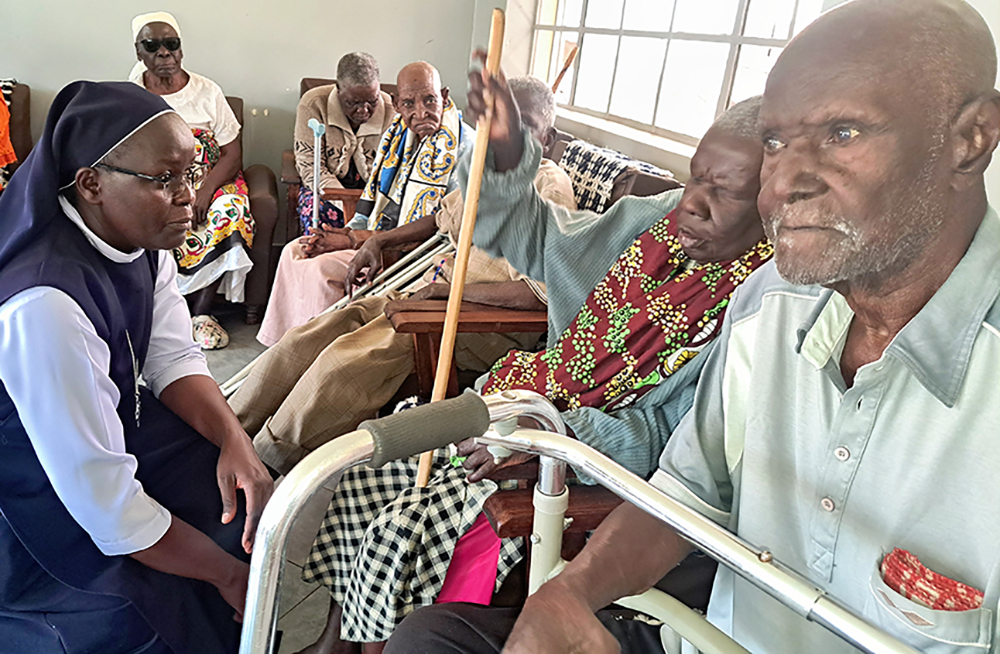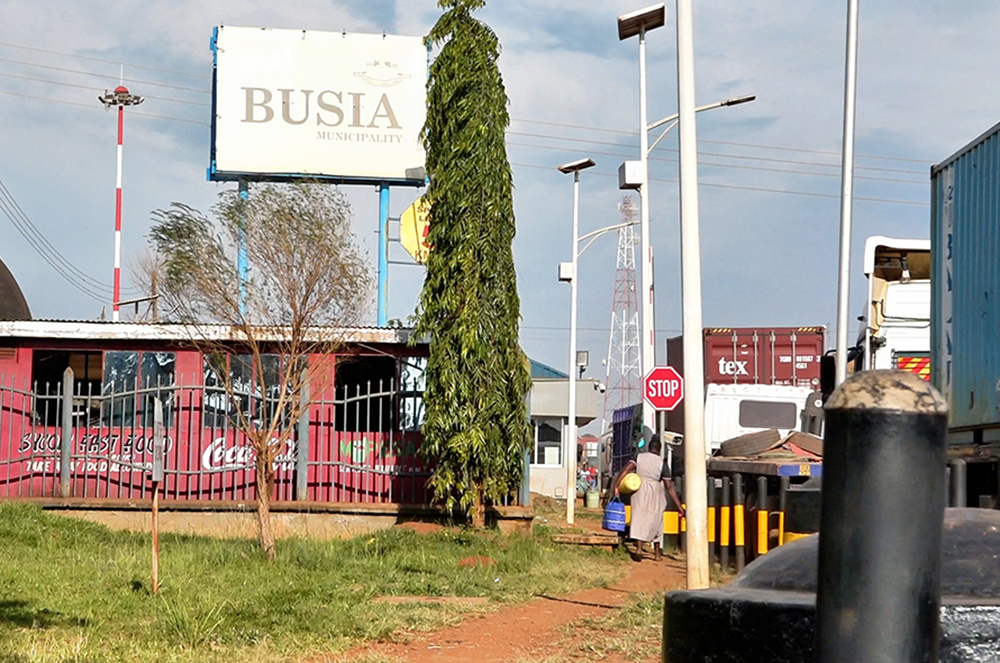
An officer wears a mask at the Malaba One Stop Border Post in Busia, Kenya, Sept. 26, 2024. The recent outbreak of mpox in Africa has sent shockwaves through communities, evoking memories of the devastating COVID-19 pandemic (GSR photo/John Mondoh)
Perched on a plastic chair in his cereal shop at this border crossing point in Busia, a town in western Kenya, George Amara is gripped with worry. On Aug. 23, a truck driver who had returned from the Democratic Republic of Congo tested positive for the mpox virus, known as clade 1b, at the border.
Since then, the East African nation, with a population of more than 58 million people*, has recorded a total of five mpox cases, with no fatalities. These cases are linked to truck drivers who passed through this border crossing point, according to health officials.
"We are very scared about this new virus. It reminds us of COVID-19," Amara, a 63-year-old father of five, told Global Sisters Report.
Amara, a Kenyan, frequently travels across the border from Malaba into Uganda to purchase cereals that he then sells to clients in Kenya. Malaba, a bustling border town in Busia, is situated between Kenya and Uganda. It serves as a crucial link connecting the two nations, facilitating a lively trade and commerce network.
Advertisement
As a one-stop border post, Malaba processes over 2,000 trucks daily, making it the busiest transit route in East Africa. The apprehension of residents of Malaba and other areas within the border comes at a time when the mpox virus has claimed hundreds of lives in the neighboring Congo, Uganda, Burundi and Rwanda — countries frequented by truck drivers who operate across multiple borders, making it easier for the virus to spread.
The first cases of mpox, a disease caused by the monkeypox virus, were initially identified in the Congo, which has documented more than 4,900 confirmed cases of mpox this year, resulting in more than 600 deaths. The World Health Organization (WHO) declared the mpox outbreak a public health emergency of international concern on Aug. 14, 2024, citing the rapid spread of clade 1b as a key factor.
Since the beginning of 2024, 14 countries in the African region have reported cases, with suspected cases totaling more than 32,000. More than 28,000 of these cases are in the Central Africa region of the Congo, according to the Africa Centers for Disease Control and Prevention (Africa CDC). The vaccination efforts in hard-hit countries have been significantly hampered by the limited access to vaccine doses.
The Africa CDC stated that it had secured approximately 4.3 million doses of vaccines, but added that it requires more than 10 million doses to effectively contain the outbreak.

George Amara, a businessman at the Malaba One Stop Border Post, shares his sentiments about the outbreak of the mpox disease. (GSR photo/John Mondoh)
The current situation has led religious sisters across the continent to increase preventive measures in their communities, workplaces, schools, churches and other public spaces. Their goal is to prevent the spread of the disease and to assist those affected in surviving, recovering and rebuilding their lives.
Sr. Monica Oduory, who manages St. Catherine's Home for the Elderly in Busia, has implemented measures to prevent the spread of the virus within the home and protect the elderly residents, who are particularly vulnerable to the disease. The home provides care for dozens of elderly individuals who are frail, unwell and homeless. The sisters ensure that the residents receive medical attention, as well as food, clothing, shelter, counseling and spiritual support.
As a nurse, Oduory emphasized that "as people age, their immune systems weaken, making them more susceptible to illnesses. Moreover, older adults are more likely to have underlying health conditions, putting them at a higher risk of contracting the disease."
"Just like with COVID-19, we've installed handwashing points at the entrance and various corners of our home," said Oduory, a member of the Grace and Compassion Benedictine Sisters. "Mpox can spread easily through close contact with infected individuals or contaminated surfaces. To protect the elderly residents and ourselves, we've restricted the number of visitors to our home."

Sr. Monica Oduory engages with the elderly at St. Catherine's Home for the Elderly in Busia, a town in western Kenya, Sept. 27, 2024. (GSR photo/Doreen Ajiambo)
Oduory, who works with other sisters, told GSR that they have been raising awareness through outreach programs near the border where they live because "they easily interact with people crossing into the country, which exposes us to a lot of risk."
She said that the sisters have been daily advising residents in churches, schools, markets and other public gatherings to take preventive measures and monitor for signs and symptoms for 21 days if they have been exposed to someone with mpox. The sisters are also strongly advocating for the use of masks when interacting with others.
According to WHO, mpox is an infectious disease that can cause a painful rash, enlarged lymph nodes, fever, headache, muscle aches, back pain and low energy. Previous outbreaks of clade 1 mpox have had a mortality rate of 10%.
"Mpox might seem small, but it has the potential to have a big impact on society," Oduory said. "That's why we hope it doesn't escalate. We are deeply concerned and afraid that it could become as devastating as COVID-19, which significantly affected our ministries as sisters, claimed many lives and disrupted the livelihoods of numerous people."
"Mpox might seem small, but it has the potential to have a big impact on society."
— Sr. Monica Oduory
Sr. Felicitas Lukong from Cameroon emphasized that the religious sisters in the country are fully equipped to tackle any confirmed cases of mpox as declared by the government. She underscored their proactive approach in raising awareness to halt the spread of the disease, highlighting their collaboration with community groups and training of local leaders to ensure the widespread dissemination of vital information about the virus and its prevention.
Since the start of the mpox outbreak in 2022, Cameroon has documented 50 cases and 5 fatalities, resulting in a case fatality rate of 10%. There have been no new cases reported since April 14, 2024.
"We cannot afford to overlook this disease as it has already claimed lives, even in our own country," said Lukong, an anesthetist and member of St. Therese of the Child Jesus of Buea in Cameroon. "Our medical and religious staff are joining other teams to create awareness about the virus to ensure it doesn't spread. We are also praying for the families whose members have been affected or who have lost a loved one."
Sr. Rosemary Kyatukwire of the Missionary Sisters of Mary Mother of the Church from western Uganda mentioned that her country is at risk of contracting the mpox due to its proximity to Congo, where the disease is widespread. Many people from the Congo are seeking refuge in Uganda to escape the conflict between M23 rebels and the Congolese military in the eastern part of the country. As of April 2024, Uganda was hosting approximately 1.62 million refugees and asylum seekers from the Congo and other regions.
The East African nation, with a population of over 49 million, had reported 10 confirmed cases of mpox as of Sept. 2.

A sign stands near Busia One Stop Border Post, situated between Kenya and Uganda. (GSR photo/Doreen Ajiambo)
"As sisters working in the medical ministry, we are vigilant about the Mpox disease," said Kyatukwire, who is the administrator of Comboni Hospital in western Uganda. "Some of the sisters are creating awareness and taking preventive measures by treating people with mpox symptoms. However, we have not delved deeper into it because it has not reached alarming levels. We are very cautious because prevention is better than cure."
Meanwhile, Mercy Sr. Mary Oladimeji from Nigeria expressed gratitude to WHO for delivering 10,000 doses of mpox vaccines to combat the spread of the new strain of the virus. She emphasized that Nigeria, as the most populous nation in Africa with nearly 237 million people, is at a very high risk of spreading the virus in the region.
Nigeria has been grappling with cases of mpox for several years, reaching a peak in 2022. As of Aug. 10, the country has reported 786 cases, with 39 of them confirmed. None of these cases have been fatal.
"We are taking precautions to protect ourselves and the people we serve from the virus before it becomes another COVID-19," Oladimeji said. "I urge everyone to stay vigilant and take decisive actions to prevent and combat this disease."
*Corection: An earlier version of this story had an incorrect population tally.





